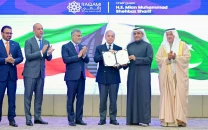Lifesaver: Keeping mothers in better shape
A cheap tablet and better care can help save thousands of women.

A cheap tablet and better care can help save thousands of women. PHOTO: FILE
“Azeema’s delivery became complicated when initially the midwife assured the family wrongly that everything was under control, but after wasting considerable time, she expressed her inability and advised us to take her to a specialist doctor. We rushed her to Gilgit but it was too late,” says Khan. The experience taught Khan better, but not many get second chances. If her husband had not put in extra efforts to save her life and get her treated in time, Azeema, like her friend would today be just a statistic, a story.
In such remote rural areas, every mother has a story to tell – stories of deaths that could have been prevented.
Bleeding to death
Azeema’s unnamed friend is one of Pakistan’s 16,000 women who die annually during childbirth. Out of these, some 5,000 die due to Postpartum Hemorrhage (PPH), the leading cause of mothers dying. If the woman needs emergency surgical delivery, in most cases she never makes it to the nearest hospital in time and bleeds out and dies at home or on way.
Hope in a miracle drug
It’s inexpensive and almost free of side-effects. Helping the uterus to contract after childbirth and therefore reducing blood loss, Misoprostol can save lives. It has been included in World Health Organisation’s (WHO) model list of essential medicines. The National Committee for Maternal and Neonatal Health (NCMNH) has been advocating for the inclusion of Misoprostol in the national essential medicines list of Pakistan. “I instruct doctors and midwives attending childbirth to carry these tablets in their purse at all times to save lives of their patients,” says Dr Sadia Ahsan Pal, gynaecologist and obstetrician.
Distant treatment
“If the mothers have regular checkups the complexities could timely be addressed,” says Dr Shujaat Ali of City Hospital Gilgit. “In most cases, they come to doctors at the 11th hour when things have already deteriorated.” “We are trying to address issues within the given resources but it’s really a tough job,” said Gulbar Khan, health minister in Gilgit-Baltistan.
Published in The Express Tribune, May 27th, 2013.



















COMMENTS
Comments are moderated and generally will be posted if they are on-topic and not abusive.
For more information, please see our Comments FAQ